Advertisement
'You Do Know Who His Wife Is, Don’t You?': My Brush With Mia And Nomar
Resume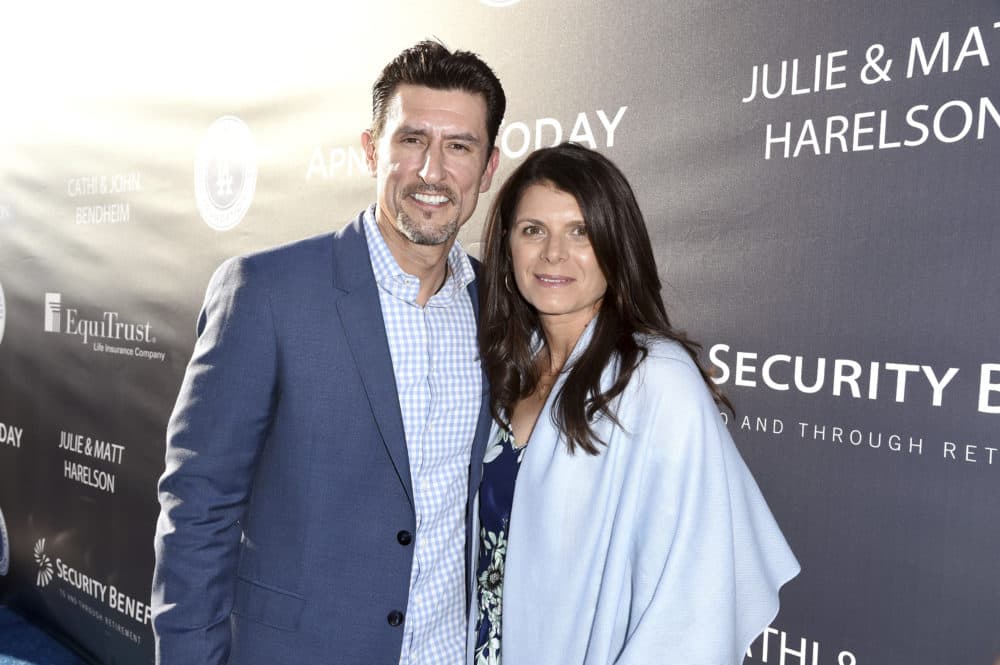
A few weeks ago, I called up my friend Hannah. We met in kindergarten, where Hannah took on the critical job of distracting me every morning so my parents could successfully drop me off.
"One of us was having some separation anxiety," Hannah says with a laugh.
When Hannah and I spoke, she was just three weeks away from getting married. The reason I was bothering her during this busy time was that she had been present for one of the more embarrassing moments in my childhood: The Cheesecake Factory Incident.
While this incident involves two famous and talented sports stars, it’s a tale I’ve kept secret from you, dear Only A Game listeners, for the past seven years.
But, with the show coming to an end, it’s time to finally come clean — and to try to make amends.
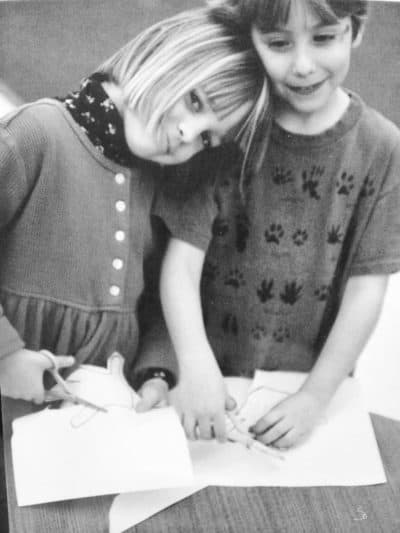
A Trip To The Cheesecake Factory
To tell you this story, I also called up two of Only A Game’s biggest fans: Rod Kessler and Sarah Abrams. They're my parents.
Back in 2003 or 2004, when I was 12 or 13 years old, I went to the Cambridgeside Galleria Mall near Boston with them (this was before their divorce) and Hannah.
We ended up at the Cheesecake Factory for lunch.
"I do remember it being dark," Hannah says. "The Cheesecake Factory there is actually kind of dark, because there’s no windows on most of it."
"I remember sitting at the table with your dad, and you and Hannah," my mom says. "And the waiter, it was a man —"
"Probably in his late 20s or early 30s," my dad says.
"He was taking our order," my mom says. "And then he turned to you."
"And whispered somewhat conspiratorially," my dad continues, " 'You won’t know who’s here, but it’s Nomar Garciaparra.' "
'You Do Know Who His Wife Is, Don’t You?'
Nomar Garciaparra was the Red Sox' star shortstop. He was a big deal in Boston, especially for kids my age. His rise to stardom coincided perfectly with our getting old enough to really follow baseball.
"I think he generated a lot of interest and excitement — you know, with that name on the back of his uniform that stretched impossibly long," my dad says, "and, of course, his little superstitions, pulling his gloves."
"You know, everyone was amused by that," my mom says. "He was beloved."
"He was a superstar," my dad says. "He was a heroic figure around Boston."
And now he was sitting just a few booths away.
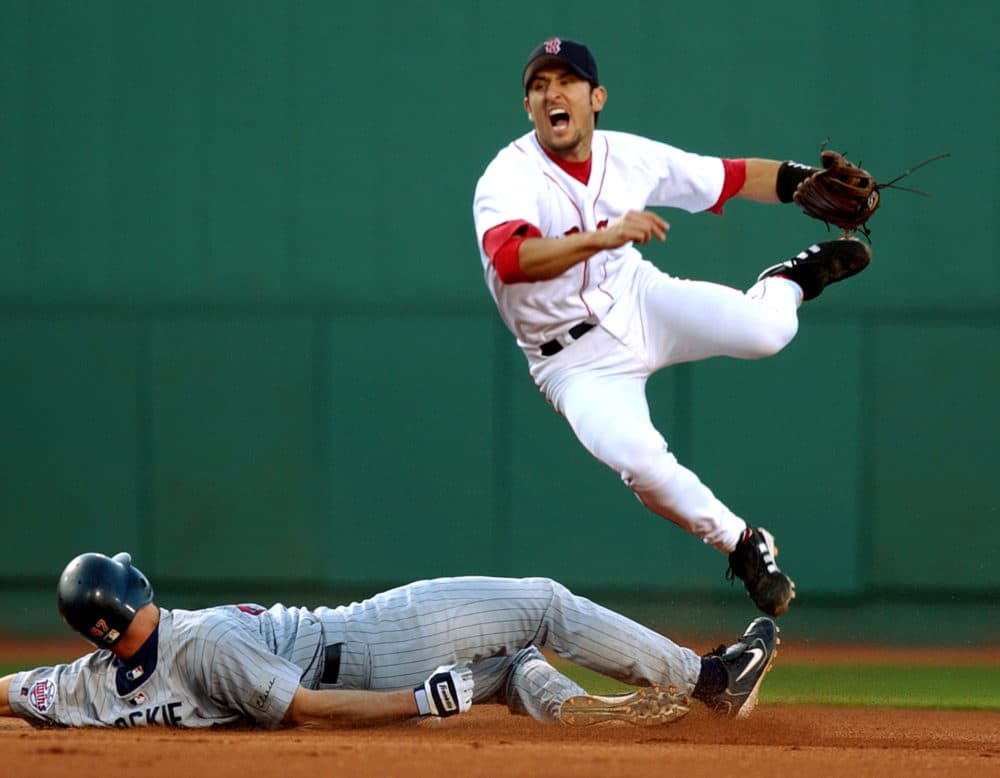
This was surely the greatest thing that had happened to me since getting a Charizard in a pack of Pokemon cards.
Hannah, who loved soccer, wasn’t quite as excited.
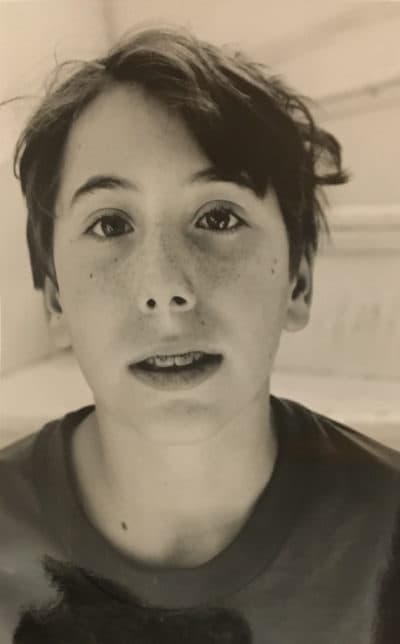
"Baseball ... not really my thing," she says.
So, if I was going to try to get Nomar’s autograph, I was going to have to go by myself.
The waiter tipped me off after Nomar put in his order and told me that I should approach before his food arrived.
"You must have followed the waiter to another part of this restaurant, because I believe Nomar’s booth was pretty much out of sight of most other people," my dad recalls.
Clutching a pen and a white Cheesecake Factory cocktail napkin, I headed for Nomar.
But, despite our waiter’s impeccable gameplan, I quickly realized there was a problem: as I rounded the corner and caught sight of Nomar, I saw that his pizza had just arrived. Not only that, Nomar had just lifted his fork and knife — yes, if memory serves, Nomar was going to eat a personal plain cheese pizza with a fork and knife — and was about to dig in for his first bite.
I should have turned around. But I was like an overeager baserunner who had too much momentum to suddenly pull up at third base. I kept barreling toward home.
"You do know who his wife is, don’t you?"
Sarah Abrams, Martin's mom
I approached Nomar’s booth. And asked for his autograph.
He set down his fork and knife, and he took my pen and napkin.
Nomar didn’t say much. But the woman sitting across from him did. She asked me my name. I told her. She smiled and said they had a friend named Martin.
Nomar finished signing the napkin, and I left.
"I just remember you came back, and you had the autograph," my mom recalls. "And I wanted to know how it went. And what I remember you saying is that he was OK, you know, but his wife was really nice. And I said you do know who his wife is, don’t you?"
A Missed Opportunity
In 1998 Nomar had attended a promotional event at Harvard. Also there? Mia Hamm, the star of U.S. soccer.
The story goes that Mia and Nomar competed against each other in a soccer shootout.
Nomar scored three goals. Mia scored four. Five years later they were married.
So "Nomar’s wife" — the woman who’d been so kind to me while Nomar was signing my cocktail napkin — was Mia Hamm.
"You were not impressed," my mom tells me. "Not at all. But I can’t remember: is it because you didn’t know who she was, or you knew who she was and it just didn’t matter to you. It was all about him."
"Oh, man," I say. "I’m so disappointed in myself. I guess in my memory I — or at least I hoped that as soon as I found out that it was Mia Hamm that I would’ve immediately recognized my mistake, but you’re saying that wasn’t the case?"
"That’s not what I recall," my mom says. "But I do remember what you said was that she was very nice."
An 'Admittedly Odd Media Request'
In the years since, especially as I’ve worked for a show that made it such a priority to share stories of athletes both male and female, I’ve grown more and more horrified and saddened by my failure to recognize — and appreciate — Mia Hamm, especially as I’ve heard more from women my age about the importance of watching Mia Hamm and the 1999 U.S. Women’s National Soccer Team.
"I never had a female coach until high school — not even like an assistant," Hannah tells me. "And so that was part of the allure of the women’s national team was like: there’s women out there somewhere who are older than me who know what they’re doing.
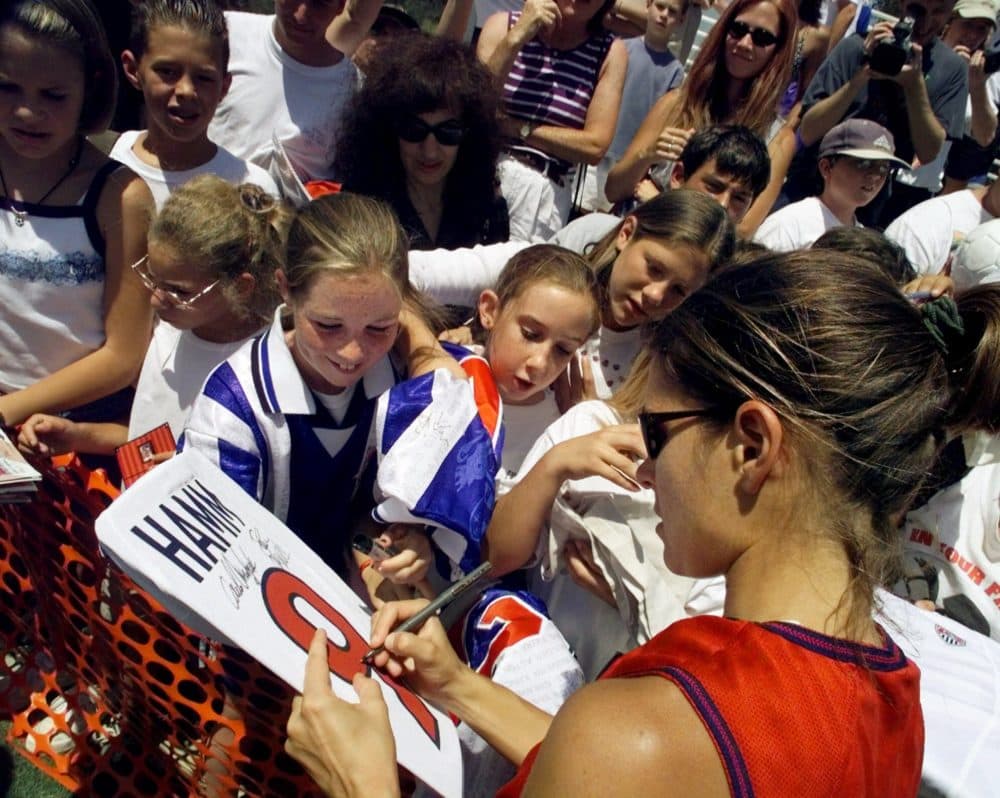
"When you saw the crowd, you saw kids that looked like us. You saw girls at a sporting event, which I think ... usually when you think of sporting event you think of mid-40s dudes with a beer."
A little over a year ago I sent an email to Mia Hamm’s agent. The subject line read: "Admittedly odd media request."
I was sure Mia and Nomar wouldn’t remember our interaction, but I wanted to have a deeper conversation about the way women’s sports have grown in status over the past 15 or so years.
I knew this was going to be tough. Mia, famously, does not like media attention. When she was profiled in Sports Illustrated in 2003, the cover featured a picture of her with the words "The Reluctant Superstar." (In fact, buried in that article was this line: "It's a relief when slack-jawed strangers approach and walk right past her, to [Nomar]." Reading that made me feel a bit better about the snub.)
"Part of the allure of the women’s national team was like: There’s women out there somewhere who are older than me who know what they’re doing."
Hannah Malzadeh
Multiple requests to Mia’s agent got me nowhere, so I reached out to the Dodgers (Nomar now works as an analyst for their TV network) and got this response: "Going through Nomar on something involving Mia is not advised." (Which, to be honest, I sort of loved because it just shows you who is more in demand these days.)
Last Saturday I got a final rejection from Mia’s agent. He wrote in part, "As you can imagine we are in challenging times and Mia and Nomar are juggling a lot of things with their work and children."
I guess I missed my one chance with Mia Hamm.
But some of these bigger questions that I wanted to ask Nomar and Mia — about the place of women’s sports in America — I was still able to explore with a soccer superstar.
Kristine Lilly
Kristine Lilly and Mia Hamm debuted on the U.S. national team together as teenagers. Lilly retired as the second leading goal scorer in U.S. soccer history.
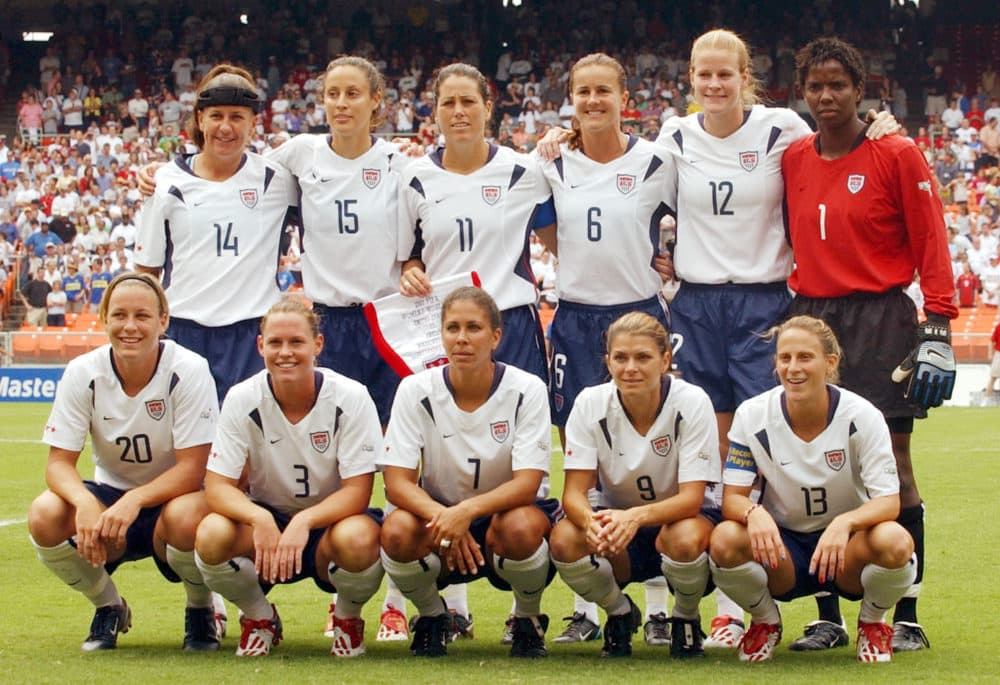
But that’s not the only reason she was the perfect person to talk to for this story. She played for the Boston Breakers in the early 2000s. She knew the Boston sports culture then. Better yet, she even knew the Cheesecake Factory at the Cambridgeside Galleria.
"Yup, familiar with it," she tells me.
So I told Kirstine Lilly the whole story, about going up for the autograph, then finding out I'd been talking to Mia Hamm — and I asked for her reaction.
"Well, I think it’s an innocent — it’s innocence and life and society at that time," she says. "Yes, we won the World Cup in '99, so I think people were just recognizing us and knowing our names. But I think if you weren’t totally into the sport, it wasn’t something that you would just think, 'Oh, there’s Mia.' ”
"How often would you get recognized just out and about back in like 2003?" I ask.
"It was a good amount yes and a good amount no," she says. "I lived in Brookline, over by Coolidge Corner. ... So when I used to walk around there, this young boy befriended me. And he was a huge soccer fan. So I would see him in the neighborhood all the time and I’m, to this day, still in touch with the family.
"So I think it was one of those things where people were still kinda getting used to the women’s game, but the soccer fans kind of knew who you were."
"People were still kinda getting used to the women’s game, but the soccer fans kind of knew who you were."
Kristine Lilly
Back in 1999, 18 million Americans watched the World Cup Final. For the 2015 final, it was more than 25 million. And from 2015 to 2019, the average worldwide live audience across the entire tournament more than doubled.
My friend Hannah has seen the widening fanbase herself. Last year she went to France for the Women’s World Cup.
"It was much less of that kind of group of 8-year-old girls," she says. "You didn’t really see that. The whole stadium was sold out. Two or three people down, there was a row of eight guys enjoying the fact that you could order beer delivered to your seats. They had, like, matching USA Hawaiian shirts of some kind or something. I didn’t really understand the vibe. But they were there, and they weren’t, like, with a group of girls."
"How did it feel to see a group of jus eight 20-something dudes there?" I ask.
"It’s interesting. I feel mixed ways about it," she says. "On one hand, it’s nice that it’s being just seen as a sport that you can get really excited about and go to. But, on the other hand, I hope those gaggles of 8-year-old girls can still show up and still feel like this is a sporting event that they can still get involved in."
Before I said goodbye to Kristine Lilly, I had one last favor to ask of her.
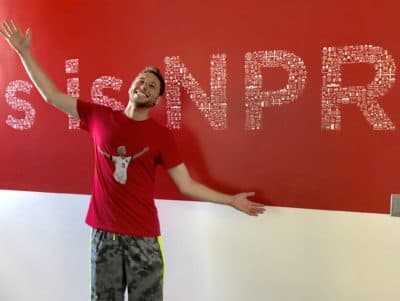
"Well, I just wanted to also say, or ask, that: next time you talk to Mia, if you could think to just please tell her thank you for being so nice to me and tell her that I’m sorry and that I’m ... "
"Martin, I’m sure she’s had that done to her many times," Lilly says. "And I think sometimes, if it was a young girl, I bet you they saw Mia and didn’t know who Nomar was. And I think it probably happens a little bit more now for Nomar than it did, especially with young girls."
But my friend Hannah has a much more important message for Mia Hamm and the other members of the 1999 U.S. Women’s National Team:
"Hey, just want to say thank you," she says. "You’ve made a huge impact in my life — in my confidence, really. I mean, it goes beyond soccer. Being good at one thing spreads to the rest of your life."
This segment aired on August 29, 2020.

